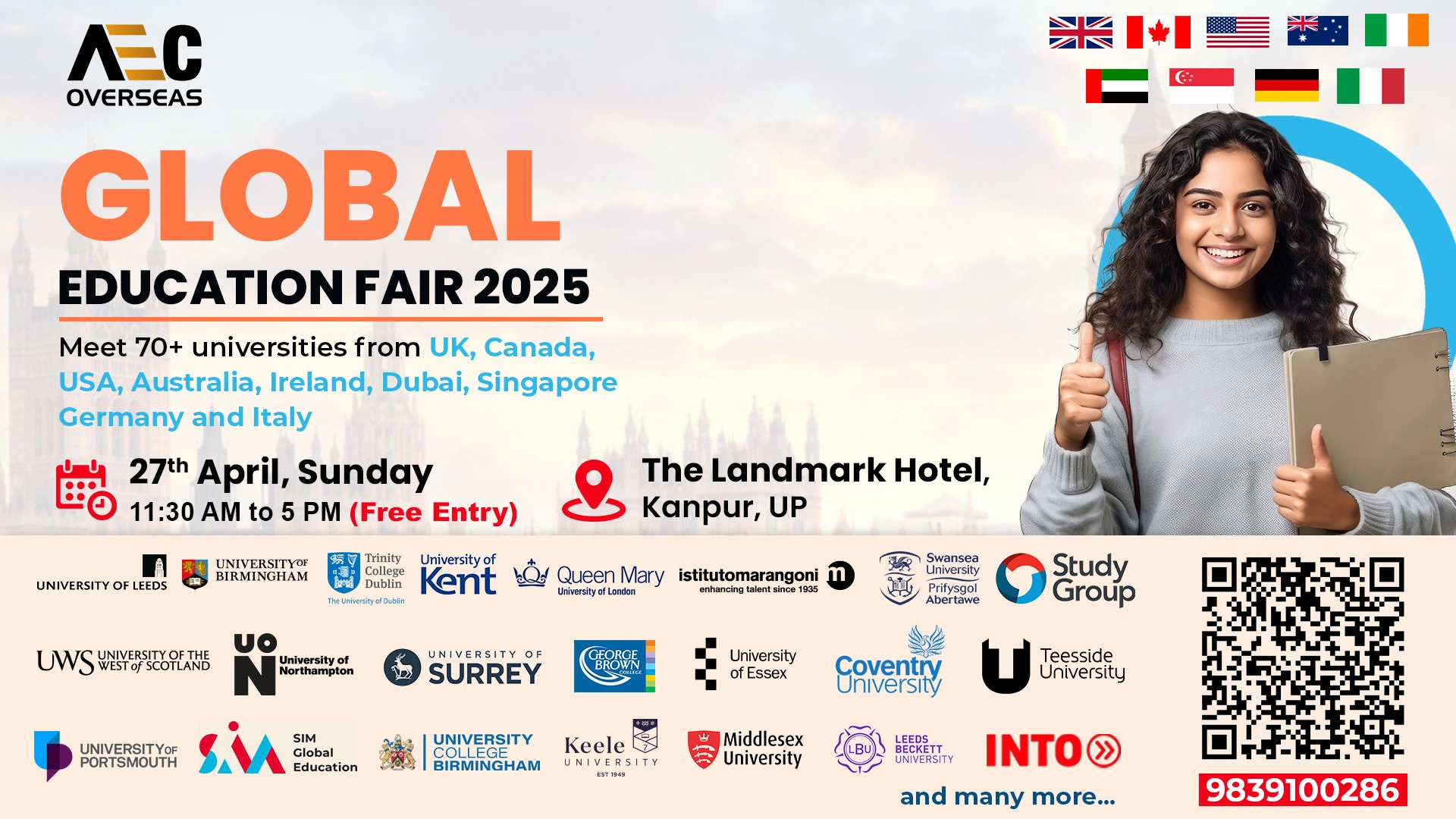Experience the American Dream
Study in the USA
With AEC Expert Support
Talk to Our Expert
Check Minimum Requirements to Study in Canada

Why study in USA?
- World-class Education
- Home to the Top 3 Best Universities in the World (MIT, Stanford, & Harvard)
- Academic Flexibility & Excellence
- Internationally Accepted Degrees
- Diverse Career Opportunities
- Research and Training opportunities
- Cutting-edge technology
- Wide variety of Courses
- American Culture & Vibrant Campus Life
- Excellent Support to International Students
- Cultural Diversity
- Financial Support (Scholarships, Stipends, & Loans)
- Improve your English skills
- Get Higher ROI on Investment
- Earn while Learning (F1 Visas)
- Personality development and independence
- Networking and Professional Connections
- Practical study & Internship
Our Student Studying at

Top Courses

International Business Management

Human Resource Management

Supply Chain Management

Marketing Management

Business Analytics

Financial Technology

Professional Accounting

Financial
Planning

Computer
Science

Wireless
Networking

Web
Development

Cyber
Security

Graphic Designing

Architecture

Project Management

Healthcare Management

Practical Nursing

Engineering

Bio Technology

Dental Hygiene

Construction Project Manaagement

Hospitality

Culinary

Sports Science
Why AEC

250,000+ Hours of
counseling experience

6 Branch Offices with more on the way

24,000+ Students placed abroad

99% Visa Success rate

experience

US$18.5 million Scholarships worth won for our students

Direct partnership with British Universities

Led by alumni or prestigious British Universities

Counselors are certified by British council
Success Stories
 Thanks to AEC my dream of studying abroad came true. Staff is very empathetic and makes sure to understand your needs. I'm grateful for AEC Team. They worked as a team to ensure all my proceedings are done smoothly & kept me updated on my application since my Visa was awaited around the same time.
Thanks to AEC my dream of studying abroad came true. Staff is very empathetic and makes sure to understand your needs. I'm grateful for AEC Team. They worked as a team to ensure all my proceedings are done smoothly & kept me updated on my application since my Visa was awaited around the same time.  I got my UK student Visa with the help of AEC, they assisted me throughout the process very well . They have a team of professionals who guides u and keeps u motivated all the time. Special thanks to Mr Piyush (The Owner) who looks after every student's requirements personally and he is available to help at any given point of time.
I got my UK student Visa with the help of AEC, they assisted me throughout the process very well . They have a team of professionals who guides u and keeps u motivated all the time. Special thanks to Mr Piyush (The Owner) who looks after every student's requirements personally and he is available to help at any given point of time.  Got 2 times refusal from IDP. Then got to know about AEC through my friend,
I am glad that AEC made it through and today I went for my passport submission Thank you to AEC team for handling my case and always being supportive n doing the best for me. AEC is the best.
Got 2 times refusal from IDP. Then got to know about AEC through my friend,
I am glad that AEC made it through and today I went for my passport submission Thank you to AEC team for handling my case and always being supportive n doing the best for me. AEC is the best.  AEC helped me with college selection and the Visa process. My medical required additional investigation, and the college denied deferral, but AEC helped me get the deferral. They are prompt in their service, and you can leave it to them so they can handle your case and be worry-free.
AEC helped me with college selection and the Visa process. My medical required additional investigation, and the college denied deferral, but AEC helped me get the deferral. They are prompt in their service, and you can leave it to them so they can handle your case and be worry-free. FAQ's
The cost of living & the cost of tuition for Indian students in the USA can vary depending on various factors such as the location of the university, lifestyle choices, and individual preferences. On average, international students in the USA has to pay between $20,000 to $40,000 per year for undergraduate programs and $25,000 to $50,000 per year for graduate programs. The estimated cost of living comes to around $10,000 to $18,000 per year, which averages around $1000 to $1500 per month.
Yes, studying in the United States can prove to be quite costly. The cost of education can vary according to the type of institution (public or private), the location, the program of study, and the level of degree being pursued (undergraduate or graduate). The Public/State Universities charge an annual tuition fee ranging from $8,000 to $35,000. Whereas, Private Universities in the USA charge between $25,000 to $55,000.
To apply for a student visa to study in the USA, first, apply to a US university and receive either of the two forms: Form I-20 (Certificate of Eligibility for Non-immigrant Student Status) for F-1 and M-1 students, and Form DS-2019 (Certificate of Eligibility for Exchange Visitor (J-1) Status for J-1 students. Then, pay the I-901 SEVIS fee in the online mode. Finally, fill out the Online Non-immigrant Visa Application (Form DS-160) at the US embassy or consulate nearest to you. In the end, make an appointment for your visa interview
Yes, scholarships and financial aid are available for international students studying in the USA. The options and the eligibility criteria may vary among institutions. Many universities offer merit-based, need-based, or a combination of both scholarships specifically for international students. Government-sponsored scholarships such as Fulbright Program are also available. Various private organizations, foundations, and corporations provide scholarships for international students.
All International students have to appear for the English language standardized test as part of the admissions process at US universities and colleges. Some of the commonly accepted English language tests are CAE (Cambridge Assessment English), IELTS (International English Language Testing System), & TOEFL (Test of English as a Foreign Language). You have to earn a specific score in this exam.
Choose student housing that suits your budget: shared dorm rooms or private apartments. Take the help of online resources and university websites to browse international student housing listings. You can also seek guidance from university student advisors for housing options that matches your preference. Take help from websites and platforms specialized in housing listings, such as Zillow, Apartments.com, Craigslist, or Rent.com.
As an international student studying in the USA, you may be eligible to work on or off campus with certain restrictions. You can work part-time (up to 20 hours per week) during regular academic sessions and full-time during scheduled breaks (such as summer or winter vacations). International students enrolled full-time and with valid F-1 status can generally work on campus.
In the USA, the duration of undergraduate and graduate programs can vary depending on the field of study and the academic institution. Undergraduate Programs such as Associate’s Degree typically takes two years to complete & Bachelor’s Degree typically takes four years to complete. On the other hand, Bachelor’s program such as Master’s Degree typically takes one to two years to complete, and Doctoral Degree (Ph.D.) typically takes four to six years to complete.
Admission requirements for international students in the United States can vary depending on the institution and the level of study (undergraduate or graduate). Start by researching and identifying the universities or colleges that offer the programs you’re interested in. International students are typically required to demonstrate their English proficiency. The most commonly accepted English language proficiency tests are the Test of English as a Foreign Language (TOEFL) and the International English Language Testing System (IELTS). Prepare your academic transcripts or records from your previous educational institutions.
There are numerous opportunities for internships or work experience in the USA across various industries. Some common avenues for internships and work experience include Corporations and Companies, Non-profit Organizations, Government Agencies, & Start-ups.
















